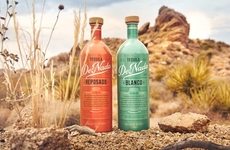
Ford Repurposes Waste Agave from Jose Cuervo Plantations to Build Cars
References: corporate.ford & design-milk
Drinking and driving isn't a good idea, but that doesn't preclude alcohol distilleries and car manufacturers from pairing with one another to produce more sustainable car parts. Ford Motors and Jose Cuervo have done just that, joining forces to turn the waste material from agave, the plants that become tequila when fermented, into sustainable car parts like cup holders, fuse boxes and many other plastic portions of Ford cars.
Though many tend to focus on reducing carbon emissions when thinking about making cars greener, the construction of cars themselves can often contribute to waste production. Plastic is just such a culprit, with many types of the material coming directly from manipulating petroleum. If sourced in a sustainable fashion, however, plastic is a durable and versatile material -- which is why so many products use it in the first place.
Ford, by partnering with Jose Cuervo to produce plastic fiber car parts from natural sources, shows that even large corporations are recognizing the benefits of green decision making.
Though many tend to focus on reducing carbon emissions when thinking about making cars greener, the construction of cars themselves can often contribute to waste production. Plastic is just such a culprit, with many types of the material coming directly from manipulating petroleum. If sourced in a sustainable fashion, however, plastic is a durable and versatile material -- which is why so many products use it in the first place.
Ford, by partnering with Jose Cuervo to produce plastic fiber car parts from natural sources, shows that even large corporations are recognizing the benefits of green decision making.
Trend Themes
1. Agave-based Car Parts - Exploring the use of agave waste as a sustainable material for car parts presents opportunities for reducing waste production and utilizing natural resources.
2. Sustainable Plastics - Using sustainably-sourced plastic fibers presents an opportunity for reducing waste production in industries that rely on plastic parts.
3. Collaborative Sustainability - Collaborations between companies in different industries such as car manufacturing and alcohol distilling presents opportunities for developing sustainable solutions to common environmental challenges.
Industry Implications
1. Automotive - The automotive industry can benefit from exploring the use of sustainable materials for car parts to reduce waste production.
2. Alcohol Distilling - The alcohol distilling industry can explore partnerships with other industries to repurpose waste products for sustainable solutions.
3. Plastics Manufacturing - The plastic manufacturing industry can benefit from utilizing sustainable sources of plastic fibers for production to reduce waste production and improve sustainability practices.
2.5
Score
Popularity
Activity
Freshness















